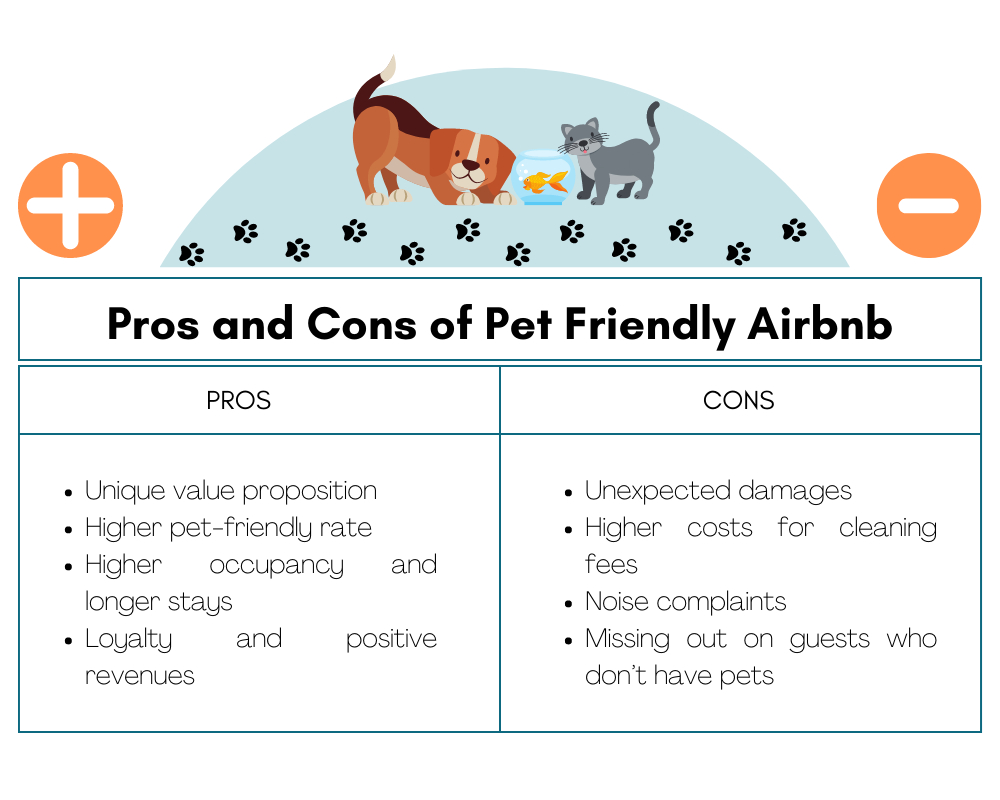Key Takeaways
Always confirm the presence of a pet before taking any action.
Immediately contact the guest to discuss the situation.
Inquire if the pet is a service animal, as different rules apply.
Understand your rights and responsibilities under the Americans with Disabilities Act (ADA).
Consider options like allowing the pet with conditions or asking the guest to make alternative arrangements.
Quick Tips for Dealing with Unsanctioned Pets in Vacation Rentals
Discovering that a guest has brought a pet to your non pet-friendly Airbnb or Vrbo vacation rental can be stressful. However, handling the situation calmly and fairly can prevent a negative review and protect your property. Here are some quick tips to get you started:
Confirm the pet’s presence.
Contact the guest immediately.
Inquire if the pet is a service animal.
Understand legal considerations.
Communicate your decisions clearly.
“Top 18 Airbnb House Rules for Guests …” from completehospitalitymanagement.com and used with no modifications.
Initial Steps to Take
When you discover a pet at your non pet-friendly rental, the first step is to confirm its presence. You might notice pet hair, hear barking, or receive a complaint from a neighbor. Once you’re sure, it’s time to act.
Confirm the Pet’s Presence
Before jumping to conclusions, ensure that the pet is indeed on your property. Check for any signs such as pet food, water bowls, or pet hair. Sometimes, a neighbor might inform you about a pet they’ve seen or heard. Always double-check to avoid misunderstandings.
Contact the Guest Immediately
Once you’ve confirmed the pet’s presence, reach out to your guest right away. A polite but firm message can go a long way in resolving the issue without escalating it. Here’s an example message you could use:
“Hi [Guest’s Name], I hope you’re enjoying your stay. I noticed a pet on the property, and I wanted to remind you that our house rules do not allow pets. Can you please confirm if the pet is a service animal? Thank you for your understanding.”
Inquire if the Pet is a Service Animal
When contacting the guest, ask if the pet is a service animal. Under the Americans with Disabilities Act (ADA), service animals are not considered pets, and different rules apply. You are allowed to ask two specific questions:
Is the animal required because of a disability?
What work or task has the animal been trained to perform?
Remember, you cannot ask for proof of the disability or the service animal’s certification. Handle this inquiry delicately to avoid offending the guest.
Understanding Legal Considerations
Knowing the legal landscape is crucial when dealing with unsanctioned pets. This knowledge not only protects you but also ensures that you handle the situation fairly and lawfully.
Americans with Disabilities Act (ADA) Guidelines
The ADA requires hosts to accommodate service animals, even in properties that do not allow pets. A service animal is defined as a dog that has been individually trained to do work or perform tasks for an individual with a disability. Emotional support animals, however, are not considered service animals under the ADA.
Your Rights as a Host
While you must accommodate service animals, you do have rights as a host. You can:
Ask the two permissible questions mentioned above.
Request the removal of the animal if it is out of control or not housebroken.
Hold the guest responsible for any damage caused by the animal.
Potential Consequences of Non-Compliance
Failing to comply with ADA guidelines can lead to significant consequences, including fines and legal action. Therefore, it’s essential to handle these situations with care and in accordance with the law. Remember, treating all guests with respect and fairness can help maintain your reputation and avoid legal troubles.
Best Practices for Managing the Situation
Once you’ve confirmed the presence of a pet and contacted the guest, it’s time to decide how to manage the situation. There are several approaches you can take, each with its own pros and cons. The key is to handle the situation in a way that minimizes conflict and protects your property. For instance, you could consider allowing pets that are safe around pet-safe evergreen shrubs to avoid potential damage.
Here are three options to consider:
Option 1: Allow the Pet with Conditions
If the pet is not causing any immediate issues, you might decide to allow the pet to stay with certain conditions. This approach can help maintain a positive relationship with your guest while still protecting your property.
Set clear ground rules for the guest to follow, such as:
The pet must be kept off furniture.
The pet must not be left unattended.
The guest is responsible for cleaning up after the pet.
Any damage caused by the pet will be charged to the guest.
Communicate these rules clearly to the guest and make sure they understand the consequences of not following them.
Option 2: Request Alternative Arrangements for the Pet
If allowing the pet to stay is not an option, you can ask the guest to make alternative arrangements for the pet. This might involve finding a local pet boarding facility or having a friend or family member take care of the pet during their stay.
“Hi [Guest’s Name], thank you for understanding our no-pet policy. Could you please make alternative arrangements for your pet? There are several local pet boarding facilities we can recommend. Thank you for your cooperation.”
This approach can help maintain your property’s pet-free status while still accommodating the guest’s needs.
Option 3: Ask the Guest to Leave
As a last resort, you might need to ask the guest to leave if they refuse to comply with your no-pet policy. This option should be used sparingly, as it can lead to negative reviews and potential conflicts. However, it might be necessary if the pet poses a significant risk to your property or other guests.
If you decide to go this route, be sure to document all communications with the guest and follow the platform’s procedures for handling disputes. Additionally, consider sharing your experience with other hosts on forums like Pets Can Go to get more insights and support.
Communicating Your Decisions Clearly
Regardless of which option you choose, clear communication is essential. Be polite but firm in your messages and make sure the guest understands your expectations and the consequences of not meeting them. This can help prevent misunderstandings and ensure a smoother resolution to the situation.
Damage Control and Maintaining Ratings
Handling a pet-related issue can be challenging, but it’s important to manage it in a way that minimizes damage to your property and your ratings. Here are some strategies for maintaining positive reviews and avoiding negative feedback. For more detailed advice, check out this guide on what to do when a guest brings an unexpected pet to your vacation rental.
How to Explain Your House Rules
When explaining your house rules to guests, be clear and concise. Make sure your no-pet policy is prominently displayed in your listing and in any communications with guests. If a guest brings a pet despite the policy, remind them of the rules and explain why they are in place.
“Our no-pet policy is in place to ensure the comfort and safety of all our guests, especially those with allergies. Thank you for your understanding.”
Offering Partial Refunds and Alternate Suggestions
To mitigate potential negative reviews, consider offering partial refunds or alternate suggestions to guests who are inconvenienced by your no-pet policy. This can show that you are willing to work with them and provide a positive experience despite the issue.
For example, you might offer a small refund to cover the cost of pet boarding or suggest local pet-friendly accommodations for future stays.
Soliciting Honest Feedback and Reviews
After resolving the situation, encourage the guest to leave honest feedback and reviews. This can help you improve your hosting practices and demonstrate to future guests that you handle issues professionally and fairly.
Ask the guest to share their experience and any suggestions they might have for improving your property or policies. This feedback can be invaluable in helping you prevent similar issues in the future.
Preventing Future Issues
To avoid dealing with unsanctioned pets in the future, take proactive steps to prevent these issues from arising in the first place. This involves updating your house rules and listings, implementing a clear no-pet policy, and screening guests more effectively.
Updating Your House Rules and Listings
Make sure your no-pet policy is clearly stated in your house rules and prominently displayed in your listing. Include any additional information that might be relevant, such as the reasons for the policy and the consequences of violating it. For more detailed guidance, you can refer to this guide on handling unexpected pets in vacation rentals.
Consider adding a section to your listing that asks guests to confirm they have read and agree to your house rules before booking. This can help ensure that guests are aware of your policies and reduce the likelihood of misunderstandings.
Implementing a Clear No-Pet Policy
A clear and well-enforced no-pet policy can help prevent issues with unsanctioned pets. Make sure your policy is easy to understand and clearly communicated to guests. Include specific details about what is and is not allowed, and the consequences of violating the policy. For example, you can specify that only pet-friendly plants are permitted in your garden.
For example, you might state that any guest who brings a pet without permission will be charged an additional cleaning fee and may be asked to leave. This can help deter guests from bringing pets and ensure that your property remains pet-free.
Screening Guests More Effectively
Effective guest screening can help you identify potential issues before they arise. Here are some tips for screening guests more effectively:
Ask guests to confirm they have read and agree to your house rules before booking.
Include a question in your booking form asking if the guest plans to bring a pet or service animal.
Review guest profiles and previous reviews to identify any red flags.
Communicate with guests before their stay to clarify your policies and expectations.
By screening guests more effectively, you can reduce the likelihood of issues arising and ensure that your property remains pet-free.
Final Thoughts
Handling a situation where a guest brings a pet to your non pet-friendly Airbnb or Vrbo vacation rental can be challenging, but it’s important to approach it calmly and fairly. By following the steps outlined in this article, you can protect your property, maintain positive relationships with your guests, and avoid negative reviews.
Recap of Actionable Steps
Here’s a quick recap of the actionable steps you can take:
Confirm the presence of the pet.
Contact the guest immediately.
Inquire if the pet is a service animal.
Understand your rights and responsibilities under the ADA.
Consider options like allowing the pet with conditions, asking the guest to make alternative arrangements, or asking the guest to leave.
Communicate your decisions clearly.
Explain your house rules and offer partial refunds or alternate suggestions if necessary.
Solicit honest feedback and reviews from guests.
Update your house rules and listings, implement a clear no-pet policy, and screen guests more effectively to prevent future issues.
Long-Term Strategies for Success
In the long term, focus on creating clear and comprehensive policies, communicating effectively with guests, and continually improving your hosting practices. By doing so, you can ensure that your property remains pet-free and that your guests have a positive experience.
Frequently Asked Questions (FAQ)
Here are some common questions hosts might have about handling unsanctioned pets in their vacation rentals:
Can I charge a fee if a guest brings a pet without permission?
Yes, you can charge a fee if a guest brings a pet without permission, as long as the pet is not a service animal. Be sure to clearly communicate this fee in your house rules and listing to avoid misunderstandings. For more information on pet safety, you can check out this article on pet-safe plants.
What should I do if the pet damages my property?
If the pet damages your property, document the damage and communicate with the guest about the cost of repairs. You can charge the guest for the damage, and if necessary, file a claim with the hosting platform to recover the costs.
How can I verify if a pet is a service animal?
You can ask the guest two specific questions to verify if a pet is a service animal:
Is the animal required because of a disability?
What work or task has the animal been trained to perform?
Remember, you cannot ask for proof of the disability or the service animal’s certification.
When managing a non pet-friendly Airbnb or VRBO vacation rental, it can be challenging to handle situations where guests bring pets without prior approval. It’s important to address this issue fairly to avoid damaging your rating score average. As a host, you have specific rights and responsibilities, including maintaining the integrity of your property and ensuring the comfort of future guests. For more tips on managing your property, check out our guide on pet-safe evergreen shrubs that can help keep your garden looking great even if pets are around.





